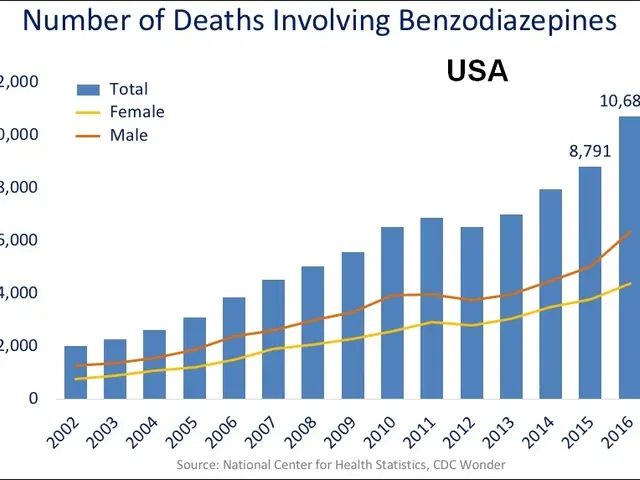Treatment Options for Erectile Dysfunction in Cardiac Patients: Explore Further Details Here
In the world of heart health and sexual wellness, finding a balance can be crucial. This is particularly true for individuals who have experienced heart disease and are dealing with erectile dysfunction (ED).
Research has shown that ED can be a potential warning sign of heart disease, or even a risk factor for it. Factors such as smoking, poor diet, high blood pressure, diabetes, obesity, and sedentary lifestyle are common risk factors for both heart disease and ED.
When it comes to treating ED in heart disease patients, the common medications used are phosphodiesterase type 5 inhibitors (PDE5 inhibitors), such as sildenafil (Viagra), tadalafil (Cialis), and vardenafil (Levitra).
However, the safety of PDE5 inhibitors in heart disease patients needs careful consideration. These medications cannot be used concurrently with nitrate medications, such as nitroglycerin or isosorbide mononitrate, due to the risk of dangerously low blood pressure. Men who are taking nitrates, often prescribed after heart attacks or for angina, must avoid ED pills entirely because combining them can cause a severe drop in blood pressure, which is potentially life-threatening.
For men who are not on nitrates and have stable heart function after procedures like stenting or surgery, PDE5 inhibitors may be prescribed but under strict medical supervision to monitor blood pressure and cardiovascular status.
PDE5 inhibitors work by increasing levels of cyclic GMP, causing smooth muscle relaxation and arterial vasodilation, which can lower blood pressure temporarily. When combined with nitrates, both drugs amplify the nitric oxide pathway, leading to an exaggerated and dangerous decrease in blood pressure.
Other considerations include the impact of certain cardiovascular medications like beta-blockers or diuretics on ED, and the potential for treating underlying cardiac issues to indirectly improve erectile function. Open heart surgery recovery and minimally invasive techniques may also affect sexual health differently, with faster recovery linked to improved outcomes for ED postoperatively.
In essence, men with heart disease who are not on nitrates may benefit from PDE5 inhibitors but always under close medical guidance. On the other hand, those on nitrates should avoid them entirely due to the risk of dangerous blood pressure drops. It is essential that these patients consult their cardiologists before starting any ED medication.
This approach ensures the balance between effective ED treatment and cardiovascular safety.
| Condition | ED Treatment Safety | Notes | |-----------------------------------|-----------------------------|---------------------------------------| | Post-heart attack without nitrates | PDE5 inhibitors may be safe | Must be medically supervised | | Concurrent nitrate use | PDE5 inhibitors contraindicated | Risk of severe hypotension | | Post open heart surgery | PDE5 inhibitors possible with caution | Recovery stage considered | | Post-stent placement | PDE5 inhibitors may be used with caution | Monitor cardiovascular stability |
- Science has revealed that depression and cardiac health are interrelated, often co-occurring, showing the importance of maintaining overall mental-health and cardiovascular-health.
- Predictive models can help identify individuals at risk of developing dysfunction in several health-and-wellness areas, including diabetes and obesity, making early intervention possible.
- Research on chronic-diseases indicates that adopting a balanced diet, regular fitness-and-exercise, and appropriate nutrition could help manage obesity, diabetes, and cardiovascular-health issues.
- In the healthcare spectrum, mental-health issues like depression could be alleviated with immediate treatment, as delayed intervention could lead to chronic depression and a harder healing process.
- A cardiac patient with underlying dysfunction may benefit from monitoring and addressing impotence, as it could reduce the likelihood of future heartattack or stroke, thereby focusing on overall health-and-wellness and fitness-and-exercise.
- Chronic diseases, such as diabetes and obesity, are often associated with dysfunctional cardiovascular-health, raising concerns for heart-health and increased risk of heartattack.
- Medical-conditions like diabetes, obesity, and cardiovascular-health issues can be reversed with the right diet, exercise, and medication, emphasizing the importance of proper nutrition and lifestyle changes in managing these ailments.
- Heart disease patients should consult with specialists about erectile dysfunction (ED) management, choosing consultation with both their cardiologists and urologists to ensure safe treatment options, such as PDE5 inhibitors, are considered.
- Science has proven that lower cardiovascular-health is linked to higher risks of fatal health-issues, such as heartattack and stroke, emphasizing the need to address any underlying cardiac dysfunction to promote overall health-and-wellness.
- Given the connection between heart health and sexual wellness, applications in predictive science and telemedicine could be explored to monitor patients for both heart disease and ED, helping to prevent cardiovascular-related complications and improve the quality of life for individuals managing multiple chronic-diseases.




